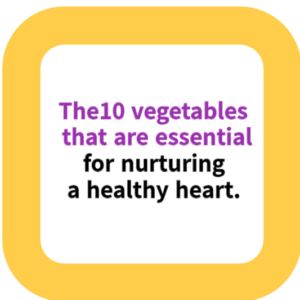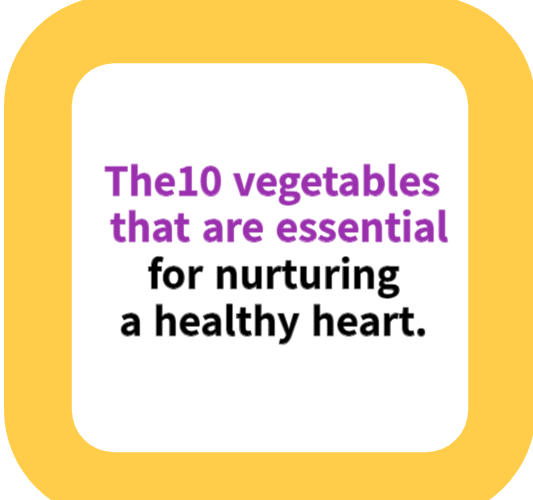The10 vegetables that are essential for nurturing a healthy heart.
Welcome to our health and wellness blog, where we’re dedicated to sharing the secrets of a heart-healthy lifestyle through the power of nutrition. In today’s feature, we delve into the 10 vegetables that are not just food for thought but are essential for nurturing a healthy heart.
From the leafy greens of spinach and kale to the vibrant hues of sweet potatoes and red bell peppers, we explore how each vegetable plays a pivotal role in cardiovascular health.
Our guide offers a comprehensive look at the unique nutrients these vegetables provide, such as beta-carotene, dietary fiber, and essential vitamins, and how they work together to reduce the risk of heart disease, lower blood pressure, and improve overall well-being.
Join us as we journey through a garden of heart-healthy choices, and discover how incorporating these nutrient-dense vegetables into your diet can lead to a happier, healthier heart.
The10 vegetables that are essential for nurturing a healthy heart.

Introduction: Nourishing the Heart with Optimal Vegetable Choices
In the quest for a robust and healthy heart, the foods we choose to eat play a pivotal role. Vegetables, with their rich array of vitamins, minerals, and antioxidants, are foundational components of a heart-healthy diet.
These nutrient powerhouses not only support overall health but also offer specific benefits that can reduce the risk of heart disease, lower blood pressure, and improve blood lipid profiles.
This expanded guide delves into the top 10 vegetables that are exceptionally beneficial for heart health, detailing the unique nutrients they provide and how these contribute to cardiovascular well-being.
1. Spinach: The Versatile Heart Health Ally
Spinach stands out as a nutritional marvel, offering a wealth of vitamins A, C, and K, magnesium, potassium, and iron. Its significant dietary nitrate content is key to reducing blood pressure and enhancing heart health. Incorporating spinach into your diet through salads, smoothies, or as a cooked side dish is an excellent way to harness its cardiovascular benefits.
2. Kale: The Antioxidant Powerhouse
Kale is a nutrient-dense vegetable packed with antioxidants, vitamins C and K, fiber, and a range of minerals. It plays a crucial role in lowering cholesterol levels and supporting heart function. The versatility of kale makes it easy to include in your diet, from salads and soups to baked chips.
3. Broccoli: The Heart’s Green Guardian
Broccoli is rich in fiber, vitamin C, and contains potent flavonoids that help reduce inflammation in the cardiovascular system. Regular consumption of broccoli can aid in preventing vascular damage, making it a valuable ally in maintaining heart health.
4. Carrots: The Beta-Carotene Heart Protector
Carrots are not only good for your eyesight but also your heart. The high levels of beta-carotene, fiber, and potassium in carrots work together to lower cholesterol and maintain healthy blood pressure, thereby reducing heart disease risk.
5. Sweet Potatoes: The Potassium-Rich Heart Helper
With their high potassium content, sweet potatoes play a significant role in blood pressure regulation. Their rich beta-carotene and fiber content further contribute to cardiovascular health, making them an excellent choice for those looking to support their heart.
6. Brussels Sprouts: The Omega-3 Miniature Marvels
Brussels sprouts are small in size but huge in heart health benefits, thanks to their high fiber, vitamins C and K, and omega-3 fatty acids content. These nutrients work together to promote heart health and reduce the risk of heart disease.
7. Garlic: The Natural Heart Health Enhancer
The cardiovascular benefits of garlic are well-documented, with studies showing its effectiveness in lowering blood pressure and cholesterol levels. Its active compound, allicin, is particularly beneficial for heart health.
8. Tomatoes: The Antioxidant-Rich Heart Support
Tomatoes are a fantastic source of lycopene, potassium, and vitamins C and K, all of which contribute to reduced risk of heart disease. The antioxidant properties of lycopene help protect the heart and maintain healthy blood pressure levels.
9. Red Bell Peppers: The Capsaicin-Infused Vitamin Boost
Red bell peppers are laden with vitamin C and contain capsaicin, which has been shown to improve heart health by lowering blood pressure and cholesterol. Their sweet flavor and versatility make them an easy addition to any heart-healthy diet.
10. Avocado: The Monounsaturated Fat Haven
Avocados are celebrated for their heart-healthy monounsaturated fats, which help lower bad cholesterol levels and reduce the risk of heart disease. Additionally, their high fiber and potassium content further support heart health.
Conclusion: Embracing a Heart-Healthy Vegetable Diet
Incorporating these 10 vegetables into your diet can make a significant difference in your heart health. Each vegetable brings a unique set of nutrients that collectively support cardiovascular function, reduce the risk of heart disease, and promote overall well-being.
By embracing a varied and colorful diet rich in these vegetables, alongside whole grains, fruits, and lean proteins, you can enjoy flavorful meals while nurturing your heart. Remember, a commitment to a heart-healthy diet is a step towards a longer, healthier life.
